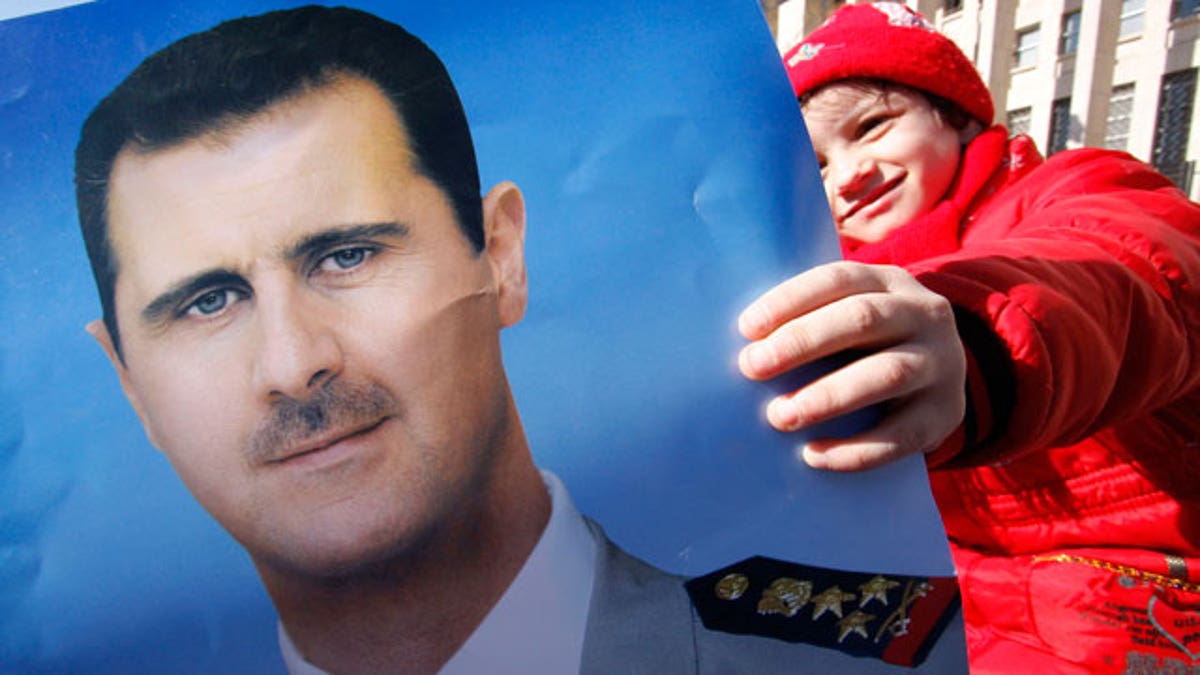
Jan. 20, 2012: A pro-Syrian regime protester holds a portrait of Syrian President Bashar Assad during a demonstration to show support for their president, in Damascus, Syria.
BEIRUT -- The Arab League is likely to extend the organization's observer mission in Syria, despite complaints from the Syrian opposition that it has failed to curb bloodshed in the country, two League officials said Friday.
Arab countries and the West have so far failed to reach any consensus on how to counter a regime crackdown which, along with other violence, has left an estimated 5,400 people dead over the past 10 months. Syrian opposition groups said security forces loyal to President Bashar Assad killed at least seven people on Friday.
Foreign ministers for the Arab League were set to meet Sunday in Cairo to discuss the future of a one-month observer mission aimed at halting violence in Syria, which expired on Thursday.
Two senior officials in the 22-member pan-Arab body said the discussions are leaning toward keeping the 150-member mission in place because the time is not right for "escalation" and the international community is not yet ready for intervention in Syria.
They said several League members opposed to the extension of the mission had changed their position in recent days. The officials agreed to talk about the discussions ahead of the Sunday meeting on condition of anonymity.
Activists have said that the Arab observers have failed to curb the bloodshed. Many in the Syrian opposition have called for the dispatch of foreign troops to Syria to create safe zones for dissidents, or even a more wide-ranging military mission similar to the air campaign which helped Libyan rebels bring down dictator Muammar Qaddafi last year.
Qatar, a harsh critic of the Syrian crackdown on protesters, called last week for the dispatch of Arab troops to the country.
Syria has said it "absolutely rejects" any plans to send Arab troops into the country, while Russia Wednesday threatened to block any U.N. Security Council resolution authorizing the use of force.
A U.S. State Department spokeswoman said Thursday the monitors have had a "mixed picture" of results, enabling some protests and some media coverage, and that it was necessary to step up economic pressure on Assad's regime.
One League official disputed that the observer mission had failed. He said the 150 observers have helped to "break the barrier of fear," especially in and around the capital Damascus. Some Arab League officials have said that the ministers meeting on Sunday may decide to double that number to 300 observers.
Activists said that least seven people were killed in Syria Friday, including six activists who were killed by security forces in two villages in the country's northern Idlib province and a warrant officer whose body was found dumped in the street in the southern city of Daraa after he had been kidnapped from his home earlier.
The Local Coordination Committees activist network accused pro-regime forces of the warrant officer's killing and said he had been helping the opposition.
Thousands of regime opponents protested following Muslim prayers Friday, some of them calling for the withdrawal of the observers.
"Arab League, your hands are now soiled with the blood of Syrians," said one banner carried by protesters in a Damascus neighborhood, a video of which was posted on the Internet.
Other protesters denounced an amnesty declared by President Bashar Assad on Sunday for "crimes" committed during the 10-month uprising. His government blames the violence in Syria on terrorists and armed gangs that it claims are part of a foreign conspiracy to destabilize the country.
Many in the opposition say the amnesty is merely a media smokescreen.
Rami Abdul-Rahman, director of the British-based Syrian Observatory for Human Rights, said about 4,000 detainees were released this week, many of them on bail and pending trial. But he said 20,000 more were believed to be detention, not counting thousands of soldiers who were imprisoned for trying to desert.
"It was an amnesty for the media, nothing more" he said.
